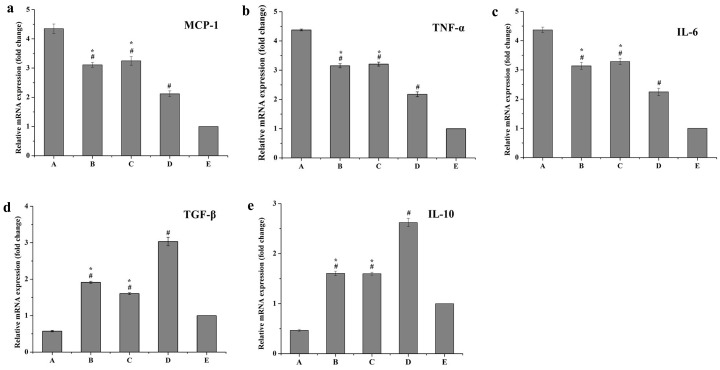Figure 11.
mRNA expression levels of pro-inflammatory factors (MCP-1, TNF-α, IL-6) and anti-inflammatory factors (TGF-β and IL-10). (A) positive control group; (B) curcumin solutions; (C) blank PS-containing carriers; (D) Cur-mNLCs; (E) negative control group; # p < 0.01, compared with A, * p < 0.01, compared with D; (a) RT-qPCR assay for mRNA levels of MCP-1; (b) RT-qPCR assay for mRNA levels of TNF-α; (c) RT-qPCR assay for mRNA levels of IL-6; (d) RT-qPCR assay for mRNA levels of TGF-β and (e) RT-qPCR assay for mRNA levels of IL-10 (mean ± SD, n = 6). mRNA expression levels (fold change) of all pro-inflammatory cytokines were remarkably reduced in the curcumin solutions group (B), blank PS-containing carriers group (C) and Cur-mNLCs group (D), compared with the positive control group (A) (p < 0.01 for Group B, C, or D vs. Group A). The combination of curcumin and PS (Cur-mNLCs) exerted a more potent inhibiting effect, in comparison with curcumin or PS alone (p < 0.01 for Group B or C vs. Group D). Curcumin solutions (Group B), blank PS-containing carriers (Group C) and Cur-mNLCs (Group D) all enhanced the mRNA expression levels of anti-inflammatory cytokines, compared with the positive control group (p < 0.01 for Group B, C, or D vs. group A). Among the three treatment groups (Groups B, C, and D), Group D displayed the most significant effects (p < 0.01 for Group B or C vs. Group D).

